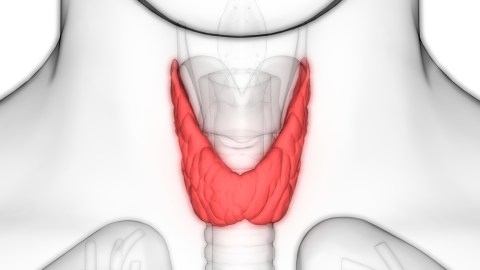20 Signs of a Thyroid Imbalance
- Category: ENT, Illness & Injuries
- Posted On:

The American Association of Clinical Endocrinologists estimates that 30 million Americans have some kind of thyroid disorder. That’s a surprising number — but even more startling is that up to 50% of people with thyroid disease aren’t even aware that they have it.
The symptoms are easy to brush off: fatigue, sleep issues, irritability, and others. But the consequences of postponing diagnosis and treatment can be serious. Untreated thyroid issues can lead to health complications ranging from an increased risk of osteoporosis to cardiovascular issues. Could you be one of the 12% of Americans living with a thyroid imbalance?
Summary of the Thyroid Gland

Situated at the front of the neck, the thyroid is a gland shaped like a butterfly. It is the powerful control center for many important body functions. This gland manufactures hormones that regulate heart rate, digestion, body temperature, and even breathing. It also controls the number of calories you burn. Problems occur with an abundance or a shortage of thyroid hormones. Issues are more likely to develop in women.
One in eight women lives with a thyroid condition. Individuals over age 60 face increased risk.
These Signs Point to Hyperthyroidism
One in every 100 Americans suffers from hyperthyroidism, caused by an overactive thyroid gland that releases a surplus of hormones. Possible causes include Graves’ disease, Plummer’s disease, thyroid nodules, toxic adenoma, and an inflamed thyroid.
Hyperthyroidism symptoms:
- Sudden and unexplained weight loss
- Irritability, anxiety, or nervousness
- Increased sweating
- Rapid heartbeat
- Tremors in the fingers and hands
- Thinning skin
- Trouble sleeping
- Growing heat sensitivity
- Fine or brittle hair
- Feeling tired all the time
These Signs Point to Hypothyroidism
Underactive thyroid strikes one in every 20 individuals who over are 12 years old. The body functions slow because the thyroid cannot produce a sufficient supply of hormones.
The cause is often an autoimmune disease. Sometimes treatment for hyperthyroidism reduces thyroid function to the extent that hypothyroidism develops. Certain medications (such as lithium) can be a cause. Occasionally, hypothyroidism is caused by congenital disease, pregnancy, iodine deficiency, or a pituitary disorder.
Hypothyroidism symptoms:
- Fatigue
- Hypersensitivity to cold
- Prolonged dry skin
- Weight gain
- Puffy face
- Memory issues
- Muscle weakness or low muscle tone
- Persistent jaundice (yellowing of eyes or skin)
- Missing periods but not pregnant
- Hoarseness of voice
How are Thyroid Problems Diagnosed?
A physician diagnoses a thyroid disorder after performing a physical exam and reviewing lab results. A simple blood test measures the patient’s amount of thyroid-stimulating hormone. This hormone is the workhorse that regulates the work of the thyroid.
If diagnosed with hyperthyroidism, treatments include orally administered radioactive iodine, anti-thyroid medications, beta-blockers, and surgery to remove part of the thyroid gland. Self-help measures include dietary adjustments and getting enough vitamin D and calcium.
If diagnosed with hypothyroidism, doctors prescribe a daily dose of a synthetic hormone called levothyroxine. Reviewing blood work makes sure the dosage is not excessive, which can cause shakiness, insomnia, an increased appetite, and heart palpitations.
Other thyroid conditions include thyroiditis, goiter, thyroid nodules, and thyroid cancer. Of these diseases, hyperthyroidism and hypothyroidism are the most common.
Symptoms of a thyroid imbalance often mimic ailments that people wouldn’t consider going to the doctor for. However, if two or more of the symptoms above affect your quality of life, consider having your thyroid tested. You can request an appointment online with one of over 50 family medicine providers at Ogden Clinic.